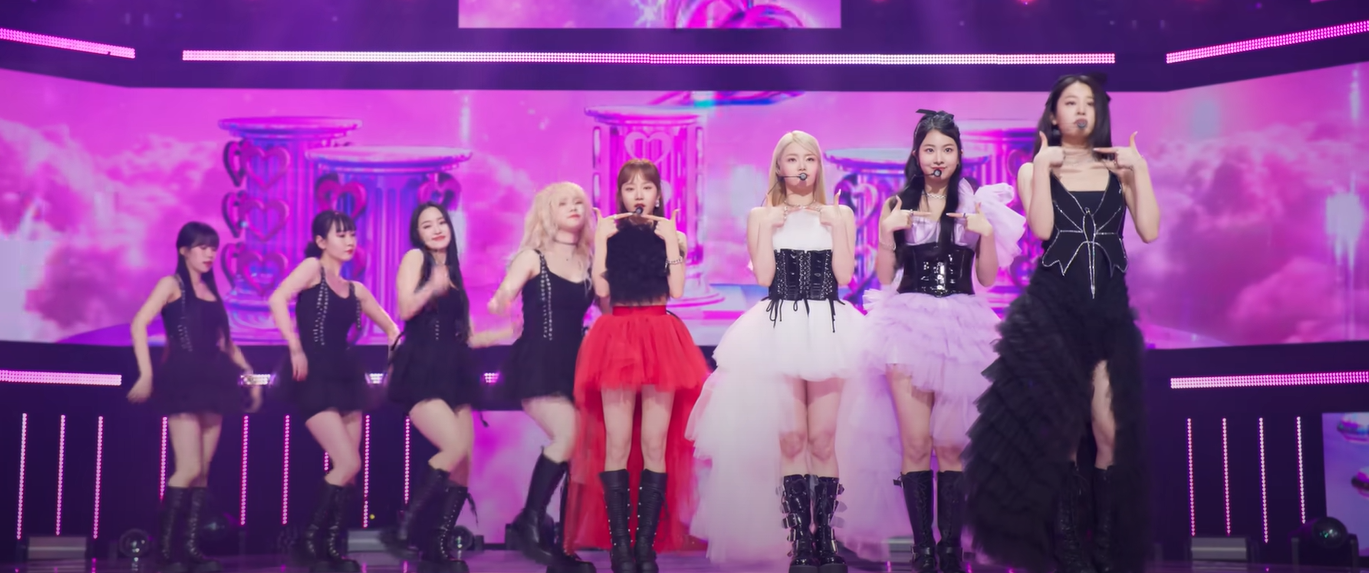Author : JUNG Hojai | K-pop columnist
0.
Personally, as a K-pop critic, the frequency of listening and enjoying to K-pop music has significantly decreased. Clearly, the decisive factor is the "age", which means "oldness" issue. And another critical reason could be the almost completed integration of K-pop into mainstream culture lately. Chairmen Bang Si-hyuk of HYBE and top-Producer of JYP Park Jin-young have already established themselves as "K-gurus" of the era, building wealth and fame across Globe. The market capitalization of K-entertainment companies has unexpectedly skyrocketed, and the demand for K-pop stars has expanded regardless of regions and industries.
In my point of view, my sensibility to pop-music is unmistakably "non-mainstream," but right now I'm finding myself swept up in the rapidly evolving K-pop trends, which is difficult for a generation like mine. I had been contemplating for a few days how to select several representative songs from the second half of 2023, but quickly realized it was an impossible task beyond my capabilities. It's no longer the right position for me to evaluate K-pop, for example not standing besides SNS short-form trends.
In the first half of this year, I had considered and chosen le sserafim's "Eve Psyche & the Bluebeard’s wife" as the representative song. It was a masterpiece where HYBE's ambition and the young members' dynamism were palpable. For the second half, I had thought of mentioning "New Jeans," "AESPA," and "G-Idle." However, my thoughts have changed. Due to the significant industrial issues this year, I have gone crazy and decided to choose Fifty-Fifty's "Cupid."

1. Changed to IP industry
For those who remember the broadcasting and entertainment industry of the late 1990s and early 2000s, the current resurgence of K-pop is likely to be perceived as an unexpected and astonishing development. Perhaps around the year 2000, when SM Entertainment's market capitalization reached several hundred billion won and the news broke that major shareholder Lee Soo-man had become a millionaire, people were taken aback, to say the least.
"Someone selling idols' songs and getting listed on KOSDAQ and becoming millionaires? The Korean stock market must be a bubble now!"
A similar situation occurred about three years ago in 2020 when HYBE went public. Many people asked, "How can BTS alone support a market capitalization of 2 to 3 trillion won?" However, three years later, HYBE has become a skyrocketing locomotive racing toward a market capitalization of 10 trillion won. The reason for this can be traced back to one thing: the belief that every hit song, every artist, and every unit turned into intellectual property (IP) that reaches billions of mouths can actually "create value. The IP business is now becoming the next big thing, not to be underestimated..
2. 1972, the Year of the Rat
The crucial foundation that led to the emergence of the true stars of K-pop, Bang Si-hyuk and Park Jin-young, born in 1972, is undoubtedly due to the significant contributions of their contemporary, "Seo Taiji", born in the same year. While Seo Taiji's influence wasn't solely due to his efforts, the appearance of this new generation of dance singers in 1992 was like a comet that injected new life into the industry. For the next 15 years or so, these artists fought fiercely against the existing system, giving strength to the creators, i.e. the copyright holders, as well as the singers and musicians.
At the forefront of this movement was none other than SEO Taiji. He experienced conflicts with the "broadcasting companies MBC, KBS, SBS", which occupy a central position of power in the music industry, fought with the "record companies", and continued the fight with the "Korea Music Copyright Association (KOMCA). etc.".
Although not widely known, another prominent figure among the new generation of creators, Bang Si-hyuk, also actively collaborated with young copyright holders throughout the 2010s, persistently challenging the influence of "telecommunication companies (especially SKT and KT). The result is the substantial emergence of a group of "creators" (lyricists, composers) who currently generate tens of billions in annual revenue. With these creators at the center of the K-pop intellectual property landscape, it is rightly said that the true revitalization of K-pop has begun.
3. FiftyFifty Dispute
Park Jin-young, better known by his nickname JYP, is a figure who has revolutionized stage performances, especially in girl groups. With his wit and manic sensibility, he can be hailed as an artist who created a prototype for "K-pop girl groups. While innovation probably took place in the midst of mutual inspiration, JYP's girl groups showed a clear contrast to SM's girl groups and established a unique prototype in the field of broadcast-oriented stage performances.
However, in this established landscape, it's not always the "well-meaning participants" who enjoy the benefits exclusively. There are bound to be parasites and villains. "Attrack and The Givers, the creators of FiftyFifty, could be just such characters.
This year, the emerging sensation "Fifty Fifty" purchased the song "Cupid" from a Swedish composer for a mere $10,000, added appropriate training and performance elements, and unexpectedly exploded onto the Billboard charts, achieving long-term success. It's as if they effortlessly climbed to the top of the Billboard charts, prompting expressions such as "How can it be so easy? This achievement is remarkable considering that they are newcomers who debuted just a few months ago. However, upon closer inspection, the details of their success reveal a rather unsavory and complex situation.
4. Song of the year?
For those who have listened to the song "Cupid," it is easily digestible pop music. Even for non-music critics, it's a "pop song" that could have been created completely outside of any Korean context, possibly in a foreign environment, as most of the lyrics are written in English. Interestingly, there is even a separate version with 100% English lyrics. Despite being a song with no specific Korean context, it was packaged as K-pop and bypassed the Korean charts to go straight to the Billboard charts.
The reason why Fifty-Fifty's "Cupid" was chosen as the song of the year is that the project itself, even without any context, demonstrated that K-pop has become a global trend. Furthermore, the unexpected success of the first song in a situation where an "investment company" outsourced the "producer" immediately revealed a story of extreme conflict. The conflict between "Attrack" and "The Givers" raises the question of whether it was meticulously planned or the result of unexpectedly rapid success.
What is clear, however, is that the huge success of "Cupid" is likely to encourage more venture-type K-pop companies to aim for such a "big hit" in the future. Although this phenomenon has been going on for two decades, the success of "Cupid" is more likely to be seen as a potential setback rather than a gain for the K-pop industry.
5. Brit pop, Paris fashion, Kpop
In the 1960s, with the creation of originality like the Beatles, and in the 1990s with Oasis, it's a very natural phenomenon in a competitive society that after such originality is established, imitation groups appear in large numbers. In Paris and Milan, many designers engaged in fierce "competitions" for leadership in the fashion industry, reminiscent of the intense competition in the music industry. It's widely known that surviving such intense battles in the end is what truly makes someone a winner.
The melodrama surrounding the Billboard entry of "Cupid" and the disputes over the group's ownership are not particularly surprising when viewed in the context of this natural competition. Originally, when an unexpected hit product emerges, legal disputes over ownership involving creators, producers, and actual players can be a natural part of the process. In this process, society can learn lessons such as the importance of legal pros and cons, the risks of court cases, and the meaning of "copyright."
Perhaps the Fifty-Fifty incident could be an event that heralds the end of K-pop's "golden era" and the beginning of a new era focused on institutional IP. The outcome of this process may include the unexpectedly sweet result of "entering the top ranks of Billboard," but it also includes the unfortunate sacrifice of late teens who aspired to be stars and ended up being not-so-wise victims in the process.

PS
- The original three members of FiftyFifty seem unlikely to return to the entertainment industry afterward.
- "Cupid" is indeed a pleasant song to listen to, but the impression that it is a manufactured song with overflowing artificial beauty remains. While it may feel awkward for a foreigner to sing a K-pop song, the fact that it is categorized as K-pop solely because a Korean sang it also feels unusual.
- Nevertheless, "Cupid" is such a beautiful song, and considering its widespread popularity, it seems fitting to label it as the song of the year.
JUNG Hojai now staying in SNU Asiacenter as a visiting scholar
![[분석] OTT 시대의 막장, 왜 반복되는가 ― 감정의 알고리즘과 욕망이 설계되는 방식](https://cdn.media.bluedot.so/bluedot.kwave/2025/12/p2hxlj_202512201852.jpg)
![[연구] 넷플릭스 한국 진출 10년을 돌아보다: ‘약한 고리 깨기’에서 ‘원숭이 꽃신’까지](https://cdn.media.bluedot.so/bluedot.kwave/2025/12/nijw81_202512140459.jpg)